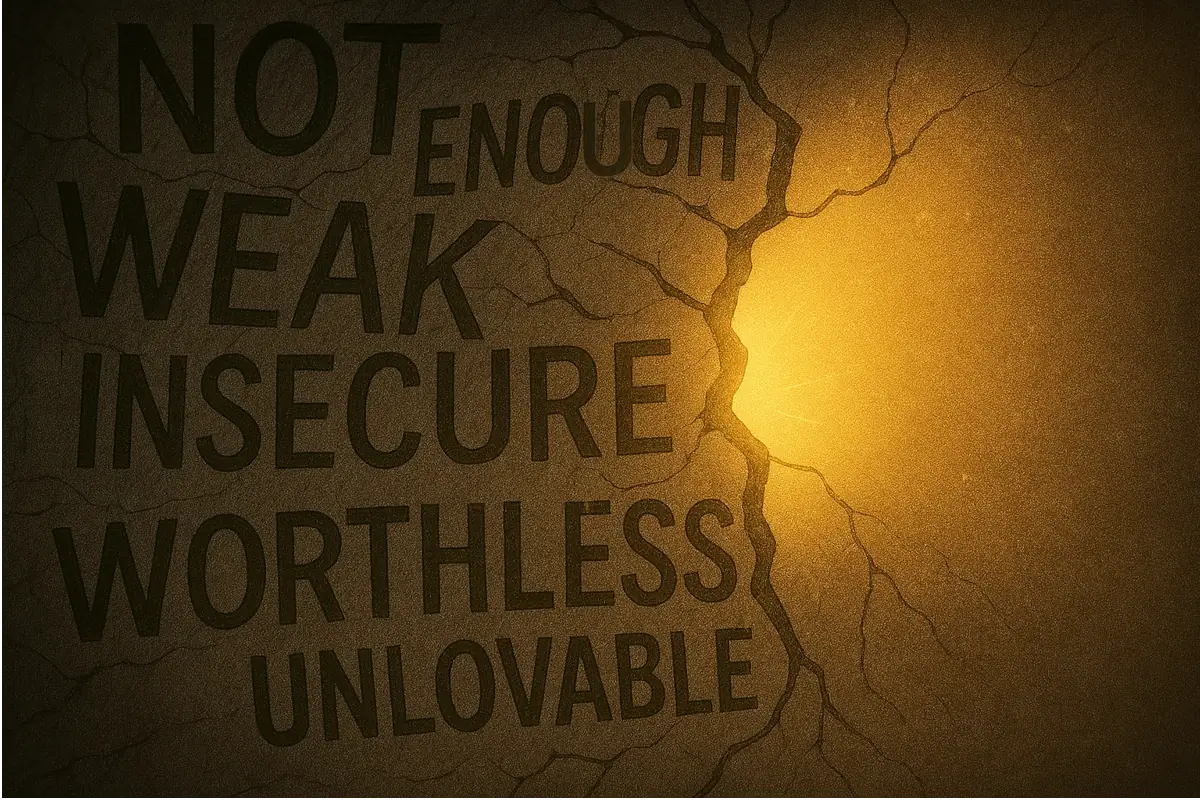The Villain That Told Me I Wasn’t Enough — And How I Fought Back with EFT
(Includes a tapping script to release the belief “I am not good enough”)
The Shape in the Corner
It starts on a Wednesday. The bus is late again. The air smells like wet concrete and car exhaust, a kind of gray taste that settles on your tongue.
Eli scrolls his phone, pretending it’s just to pass the time — but really it’s to avoid catching his own reflection in the rain-smeared window. His reflection is always waiting for him, flat-eyed, shoulders caved slightly forward as though trying to make himself smaller. The glass warps his features anyway, but that almost makes it worse. It means he doesn’t just look tired — he looks wrong.
The screen glows against the dull morning. A headline catches his eye: Kristen Bell Opens Up About a Lifelong Battle with Depression and Anxiety.
It’s from years ago, but someone’s reposted it. Kristen talks about the “dark cloud” she carried from her teens into adulthood — how it followed her into rooms where she was supposed to smile and act fine.
A dark cloud. Eli knows that feeling — but his isn’t a cloud. Clouds are soft, distant, maybe even beautiful from far away. His is not.
His shadow is tall and gaunt, with black, unblinking eyes. Its skin is pulled too tight, as if there’s something under it trying to break free. Draped over its shoulders is a coat stitched from every insult, every comparison, every moment of rejection. The stitches are jagged, the seams uneven, like it was sewn by someone who didn’t care if it held together — as long as it hurt.
It never shouts. That would almost be a kindness. Instead, it mutters in a low, constant hum: You’re not enough.
Sometimes it’s so quiet he forgets it’s there. Other times it leans close, its breath icy on the back of his neck, and says it over and over until it fills the space inside his chest where hope should be.
Kristen’s interview feels like a flare in the dark — brief, fragile, but proof that maybe this thing isn’t his alone.
Threads in the Coat
The days unfold as usual — which means the shadow is always close. It sits on the edge of his bed while he chooses clothes, its knees too sharp for human shapes. It follows him to work, perfectly matching his pace. Sometimes, just to remind him, it lets one long bony finger trail across his shoulder.
Eli can’t remember a time before it.
Flashback: Age 6
The first-grade spelling bee. His palms are damp, his knees knock together under the weight of everyone watching. He spells “friend” wrong — “f-r-e-n-d” — and hears his own voice falter as soon as the last letter leaves his lips. The class laughs. His stomach twists. The shadow steps out from somewhere — he doesn’t remember where — and wraps something scratchy around his shoulders. Don’t worry, it hums. I’ll remember this for you.
Flashback: Age 8
Third grade. The smell of chalk dust and glue. He writes the wrong answer on the board and the laughter this time is sharp enough to sting. The teacher sighs: “You’re just not trying hard enough.” The words leave her mouth and stitch themselves into the coat the shadow is building, square by square.
Flashback: Age 12
Basketball tryouts. He’s the shortest one there, the ball feels slick in his sweaty hands. He misses three shots in a row. One of the taller kids smirks and mutters, “Why is he even here?” That night, the shadow lays a new patch across the back of the coat — something heavy, like wet wool.
Flashback: Age 15
A locker slams. Two kids snicker about his shirt being “cheap.” The words don’t just sting — they confirm something he’s been suspecting all along. The shadow leans close. They see you, it whispers. And they’re right.
Flashback: Age 19
First college party. He’s standing by the snack table, pretending to check his phone while people laugh on couches and in corners. No one talks to him for almost an hour. The shadow’s hand lands on his back like a claim. You’re invisible, it says. And you’re lucky they don’t notice.
Flashback: Age 23
The breakup. Coffee shop. Cinnamon in the air. “You’re just… too much work.” The shadow smiles wide enough to split its face, tucking the moment away like a trophy.
Friday night, years later. He’s scrolling without purpose, blue light etching the tiredness into his skin. A headline stops him: Wayne Brady: “I Thought Happiness Wasn’t in the Cards for Me.” Wayne talks about the day he couldn’t stop crying, how loneliness and pressure stacked high enough to block out the sun.
The shadow perks up. See? it whispers. Even the ones who make people laugh can’t escape me. What chance do you have?
The words are soft, but they land like a stone dropped into water — the ripples touch everything. The shadow doesn’t need big moments to feed on.
When he trips over a word in a meeting, it’s there.
When a friend doesn’t text back, it’s there.
When he sees himself sideways in a store window and notices the softness of his stomach, it’s there.
Every tiny moment becomes a patch in the coat. It grows heavier, the seams pulling.
The Cell Without Bars
Sunday afternoon. The laundry is half-folded. The TV mumbles somewhere behind him. He’s halfway through a snack he doesn’t want, the salt thick on his tongue. Another headline: Billie Eilish: “I Felt Like I Deserved Pain.” She talks about believing pain was her natural state, how self-criticism became the air she breathed.
It lands in Eli’s chest like something breaking. Because deep down, he’s lived the same way. Not in words — but in the quiet surrender to bad days, the unspoken acceptance of loneliness.
The shadow shifts closer. Its coat brushes against his arm, the fabric cold, smelling faintly of mildew. For the first time, he doesn’t just see it as a bully. It’s a jailer. The bars are thoughts. And they’ve been there for decades.
Something stirs in his chest — anger, exhaustion, and the faintest flicker of rebellion. He sets the phone down. The shadow tilts its head. He opens his laptop and types: “How to do EFT tapping for self-worth.”
Naming the Enemy
That night, he sits cross-legged on his bed. The lamp casts a small circle of light. The shadow stands just outside it. “You think this will work?” it asks, its voice a little amused, a little pitying.
He doesn’t answer. He starts tapping.
Setup Statements (Karate Chop Point)
“Even though you tell me I’m not good enough, I’m open to the idea that you’re lying.”
“Even though your coat is made from every criticism I’ve ever worn, I choose to take it off.”
“Even though I’ve lived under your shadow, I am willing to see myself in a different light.”
On the last one, his voice wavers — but the shadow flinches. “You’re the villain,” he says, and his throat feels raw. “You always have been. And I’m done letting you win.”
Tapping Points — Releasing the Villain
Eyebrow: “This voice that says I’ll never measure up.”
Side of Eye: “The years you’ve been sitting beside me.”
Under Eye: “Your grip tightening when I try to rise.”
Under Nose: “The way you twist my memories into proof.”
Chin: “I’ve called you truth for too long.”
Collarbone: “You’re not truth. You’re a parasite.”
Under Arm: “And I am pulling you out, piece by piece.”
Top of Head: “Making space for someone kinder — me.”
The coat trembles. Threads loosen.
Reframe Rounds — Affirmation Ladder
“I want to believe I’m worth more than you say.”
“I am learning that your voice is not my voice.”
“I am starting to see what Wayne, Billie, and Kristen found — a way through.”
“I am enough, and I choose to live like I am.”
The shadow shrinks. It’s still there — but it looks unsure.
Pulling Threads
Morning taps before work. Night taps when the thoughts get loud. Bus rides, rain tapping on windows.
More threads pull free. Patches fall like dead leaves. And he sees it now — the shadow is not special. It’s not original. It thrives in the dark. It hates the light. Every tap is a match in its face.
When the Glass Fights Back
A month later, the bus is late. Concrete smells like rain. He catches his reflection. The shadow is far off, faint, tattered.
“I am enough.”
The words are steady, like a key turning in a lock. The shadow flinches.
Eli smiles — small, but real — and steps into the day.



